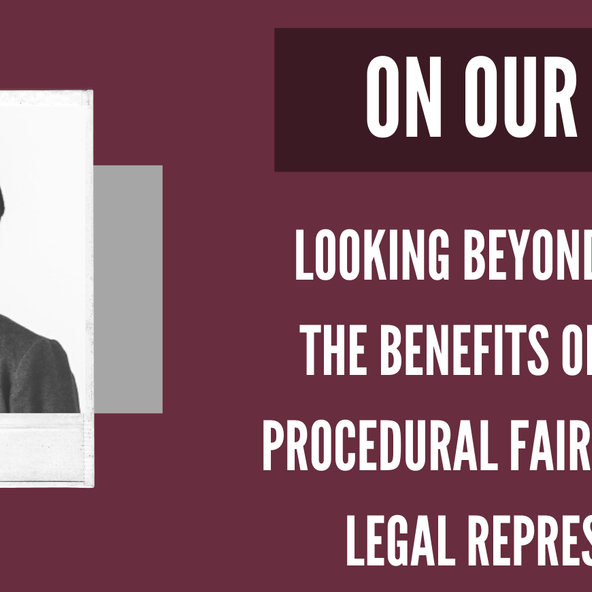
During this COVID-19 social isolation period, a vague routine at home has slowly emerged. I wake up before the rest of my family, make breakfast, and get the coffee started. Then I take a few moments to stare at what would normally be a bustling street full of morning commuters. The quiet emptiness of the sidewalks is startling and haunting. It is a daily visual reminder of the new world we suddenly find ourselves in. Inevitably, my mind shifts to the latest alarm bells in the news – the increasingly scary statistics, the waves of tragic stories, the frustration, the anger, the fear.
But finally (perhaps after the coffee has kicked in), I feel overwhelmed by gratitude, and a renewed appreciation that anything and everything could change in the blink of an eye. And in those moments, I find myself feeling thankful for my career – that I have spent most of it representing low-income folks who could otherwise not afford a lawyer.
The work feels meaningful to me on a very human level. There is no question that legal representation improves outcomes. However, I have always felt that there was something even more basic, and fairness-driven at stake.
Since my new schedule allows me slightly more time to ponder things, I have been thinking more about Tom R. Tyler’s fascinating research on procedural fairness and its relation to my work as a legal services attorney. As described in his book, Why People Obey the Law, Tyler studied personal experiences in court and willingness to accept those court decisions. He reached the startling conclusion that “people focus on court procedures” rather than “on the outcomes of their experiences.” He explains:
"If the judge treats [litigants] fairly by listening to their arguments and considering them, by being neutral, and by stating good reasons for his or her decision, people will react positively to their experience, whether or not they receive a favorable outcome."
Those who judged their experiences to be fair, in turn, are more likely to obey the law. In Social Justice: Outcome and Procedure, Tyler explains that “greater perceived fairness” enhances “voluntary acceptance of decisions, voluntary compliance with the rules, and a willingness to proactively help society and social authorities.”
Tyler finds a link between legal representation and procedural fairness in Between Access to Counsel and Access to Justice: A Psychological Perspective. In this article, Tyler and co-author Nourit Zimerman make the case for “viewing the issue of access to counsel within [the] general framework of creating a litigation experience that involves a fair procedure.” The authors also explain that “[t]he aspects found to most strongly influence the experience of litigants are voice, neutrality, respect, and trust.”
“Neutrality” relates to whether people understand “how the rules are being applied and how decisions are being made.” “Respect” is about “courtesy” but also means “showing respect for people's rights” by providing “information about what to do, where to go, and when to appear.” “Trust” involves “whether [litigants] feel that court personnel, such as judges” are “acting in the interests of the parties, not out of personal prejudices.” Finally, “[v]oice,” or the “the opportunity to present one’s case” is the dominant factor influences all others. It “leads people to feel that the forum is more neutral, the authorities more trustworthy, and the procedure more respectful to their rights.”
In my practice, I regularly see pro se litigants express frustration with their experience in court. For instance, pro se litigants sometimes react vocally when an adverse witness is lying on the stand, and they do not understand when they are not allowed to interject. Some express anger when they are prevented from admitting hearsay statements as evidence. While these types of reactions are human and natural, they clash with court customs, and sometimes cause conflicts with judges or court staff who are tasked with conducting orderly proceedings.
In one case, my colleague saw a pro se litigant storm out of court after the judge denied (without prejudice) her handwritten petition for a Civil Protection Order for failure to state a claim. I was given the chance, afterwards, to speak to this litigant. It turned out that the adverse party in the case had assaulted her, and that she would have been able to proceed with her case if her petition had simply been more detailed. Although I was able to draft a new petition for this litigant while she was still at court, she already felt rejected by a system that she viewed as being unfair and confusing. She ultimately left without re-filing her case.
I believe that such experiences lead to the complaint that I hear most often from pro se litigants: “I wasn’t allowed to speak.” Drawing from these lessons, lawyers can increase litigants’ perceptions of fairness by: (1) framing a litigant’s story into a legally relevant narrative and corroborating it with admissible evidence; (2) explaining the rules and procedures to be expected at court; and (3) mediating tensions between a highly unintuitive legal process and normal human instincts. This would create the benefit of encouraging people to obey court orders, and the law in general.
It seems that these questions – about how to enhance voluntary compliance – are particularly pertinent to our situation today. At a time when the fabric of our society may seem particularly fragile, and at a time when government authorities may lack resources, voluntary compliance with the law seems increasingly important.




